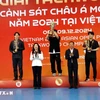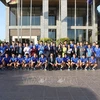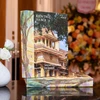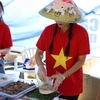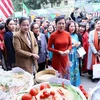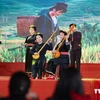Researchers and critics discussed the inspiring lives of two of Vietnam 's leading revolutionary writers at a seminar held in HCM City.
Poet Le Anh Xuan and novelist Nguyen Thi were also men of action who died fighting in the American War but the organisers of the two-day seminar, which ended on August 18, hoped readers, especially young ones, would learn more about their great contributions to literature.
Xuan, real name Ca Le Hien, was born in 1940 to a traditional family in southern Ben Tre province's Chau Thanh district. He volunteered to fight for the country's freedom and died in 1968.
His works centred mostly on his personal experiences and passion for his country and people, and highlighted the glory of Vietnamese soldiers who sacrificed their lives for the cause of the country's freedom.
His major works are a collection of poetry, Tieng Ga Gay (The Crow), which was published in 1965, and the epic Nguyen Van Troi (Hero Nguyen Van Troi) written in a simple and engaging style.
Xuan's last poem, Dang Dung Vietnam (Vietnamese Heroism), has been recognised as one of the most popular Vietnamese poems by readers.
In 2001, he was posthumously awarded the Government Prize for Literature and Arts.
Thi was born as Nguyen Hoang Ca – and was also known as Nguyen Ngoc Tan — in 1928 in the northern province of Nam Dinh’s Hai Hau district.
As a member of the South Vietnam Liberation Armed Forces, he died in the Tet Offensive of 1968.
Thi's popular novels like Nguoi Me Cam Sung (The Mother Holds a Gun, 1965) and Uoc Mo Cua Dat (The Country's Dream, 1967), remain favourites with millions of readers 40 years after they first appeared.
He was posthumously conferred the Ho Chi Minh Award for Literature and Arts in 2000.
Participants in the seminar, mostly veteran writers and critics from around the country, recommended nominating Xuan and Thi for the Hero of the People's Armed Forces award./.
Poet Le Anh Xuan and novelist Nguyen Thi were also men of action who died fighting in the American War but the organisers of the two-day seminar, which ended on August 18, hoped readers, especially young ones, would learn more about their great contributions to literature.
Xuan, real name Ca Le Hien, was born in 1940 to a traditional family in southern Ben Tre province's Chau Thanh district. He volunteered to fight for the country's freedom and died in 1968.
His works centred mostly on his personal experiences and passion for his country and people, and highlighted the glory of Vietnamese soldiers who sacrificed their lives for the cause of the country's freedom.
His major works are a collection of poetry, Tieng Ga Gay (The Crow), which was published in 1965, and the epic Nguyen Van Troi (Hero Nguyen Van Troi) written in a simple and engaging style.
Xuan's last poem, Dang Dung Vietnam (Vietnamese Heroism), has been recognised as one of the most popular Vietnamese poems by readers.
In 2001, he was posthumously awarded the Government Prize for Literature and Arts.
Thi was born as Nguyen Hoang Ca – and was also known as Nguyen Ngoc Tan — in 1928 in the northern province of Nam Dinh’s Hai Hau district.
As a member of the South Vietnam Liberation Armed Forces, he died in the Tet Offensive of 1968.
Thi's popular novels like Nguoi Me Cam Sung (The Mother Holds a Gun, 1965) and Uoc Mo Cua Dat (The Country's Dream, 1967), remain favourites with millions of readers 40 years after they first appeared.
He was posthumously conferred the Ho Chi Minh Award for Literature and Arts in 2000.
Participants in the seminar, mostly veteran writers and critics from around the country, recommended nominating Xuan and Thi for the Hero of the People's Armed Forces award./.











